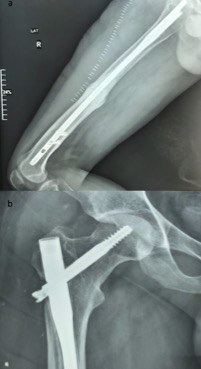A Special Technique to Remove a Jammed Cephalic Screw from an Intramedullary Nail: A Case Report
DOI:
https://doi.org/10.38179/ijcr.v3i1.37Keywords:
Cold welding, Seizing, Intramedullary nail, Removal technique, Complications, Case ReportAbstract
Background: The complexity of implant removal is a well-known problem in the field of orthopedics. It is encountered mainly during the removal of plates and screws and understood by the phenomenon of seizing or cold-welding, formerly known in mechanics. In this case study, we describe a complex experience during a gamma nail removal in a 21-year-old male patient, explained by the same phenomenon of seizing or cold-welding. The case is rather unusual and rare, with no similar reports in the literature, and required a special technique of extraction.
Case Report: A 21-year-old male presented to our clinic with a 5-months history of right groin pain radiating to the anterior thigh. The patient was a victim of a car accident three years ago that resulted in right femoral neck and shaft fractures, which were managed by open reduction and internal fixation by a long gamma nail with distal locking. After proper examination, the team decided to remove the implant. There was difficulty loosening the cephalic screw as it was welded to the nail. For this reason, we opted for a technique that involved making a transverse slit at the level of the anterior part of the nail which is in contact with the cephalic screw. It was followed by a hammer blow at the level of the cephalic screw, allowing it to loosen and thus allowing the screws along the femoral nail to be removed successfully.
Conclusion: Our report describes a rare case of a cephalic screw cold-welded/seized into the intramedullary nail, which can be an unexpected and serious complication during intramedullary nail removal. However, our technique described in this case can be an effective way to treat such a complication.
References
Sreenivasan R, Chahar D, Verma N, Pathrot D, Pankaj A. Case Report: Cold welding of barrel plate to Richard screw: an unusual complication witnessed during sliding hip screw removal. Progress in Orthopedic Science. 2016;2(4):49. https://doi.org/10.5455/pos.20161126064847
Shrestha R, Shrestha D, Dhoju D, Parajuli N, Bhandari B, Kayastha S. Epidemiological and Outcome Analysis of Orthopedic Implants Removal in Kathmandu University Hospital. Kathmandu University Medical Journal. 2015;11(2):139-143. PMID: 24096221. https://doi.org/10.3126/kumj.v11i2.12489
Georgiadis G, Gove N, Smith A, Rodway I. Removal of the Less Invasive Stabilization System. Journal of Orthopaedic Trauma. 2004;18(8):562-564. PMID: 15475854. https://doi.org/10.1097/00005131-200409000-00014
Lehmen J, Della Rocca G, Murtha Y, Crist B. Removal technique for cold-welded titanium locking screws. Injury. 2011;42(11):1377-1379. PMID: 21232740. https://doi.org/10.1016/j.injury.2010.12.025
Frandsen J, Duensing I, Anderson L, Gililland J. Disassociation of a Cold-Welded Bimodular Titanium Femoral Stem by Intraoperative Ice Cooling. Arthroplasty Today. 2020;6(3):457-462. PMID: 32637516; PMCID: PMC7329910. https://doi.org/10.1016/j.artd.2020.05.018
Seyhan M, Guler O, Mahirogullari M, Donmez F, Gereli A, Mutlu S. Complications during removal of stainless steel versus titanium nails used for int ramedullary nailing of diaphyseal fractures of the tibia. Annals of Medicine and Surgery. 2018;26:38-42. PMID: 29348913; PMCID: PMC5767899. https://doi.org/10.1016/j.amsu.2017.12.012
Davis J. Surface engineering for corrosion and wear resistance. Materials Park, Ohio: ASM International; 2001. p. 75.
Pattison G, Reynolds J, Hardy J. Salvaging a stripped drive connection when removing screws. Injury. 1999;30(1):74-75. PMID: 10396464. https://doi.org/10.1016/s0020-1383(98)00207-1
Poitout DG. Biomechanics and Biomaterials in Orthopedics. London: Springer; 2004
Minkowitz R, Bhadsavle S, Walsh M, Egol K. Removal of Painful Orthopaedic Implants After Fracture Union. The Journal of Bone & Joint Surgery. 2007;89(9):1906-1912. PMID: 17768185. https://doi.org/10.2106/JBJS.F.01536
Sanderson P, Ryan W, Turner P. Complications of metalwork removal. Injury. 1992;23(1):29-30. PMID: 1541495. https://doi.org/10.1016/0020-1383(92)90121-8

Published
How to Cite
Issue
Section
Copyright (c) 2022 International Journal of Clinical Research

This work is licensed under a Creative Commons Attribution 4.0 International License.







